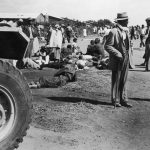eSwatini fights for free political expression
The government of eSwatini, formerly Swaziland, has exiled and clamped down on political dissidents challenging the monarch. But now, it faces a new threat: the unionised working class.
Author:
14 March 2019

King Mswati III of eSwatini has been criticised for clamping down on critical voices who challenge his authoritarian rule. Many of the activists demanding reform of the anti-democratic parts of the constitution are either in jail and or in exile.
The muzzling of dissidents became more pronounced when the king introduced the Suppression of Terrorism Act in 2008, which meant certain political parties critical of the regime were categorised as terrorist organisations. These include the People’s United Democratic Movement (Pudemo), the country’s biggest opposition party, along with its youth wing, the Swaziland Youth Congress (SWAYOCO); the Umbane People’s Liberation Army, also known as People’s Liberation Army, which is a secret militant group allegedly linked to Pudemo; and a vocal South African-based organisation called Swaziland Solidarity Network (SNN), which supports progressive organisations striving for systematic reforms and democracy.
Flanked by South Africa and Mozambique, eSwatini is predominantly a rural country with a population of about 1.3 million people. Its workers are divided into civil servants and those who receive menial wages. Underpaid workers are employed in the agricultural, textile and manufacturing industries.
In the absence of critical parties and organisations, the regime of eSwatini is faced with the rise of the unionised working class.
Power of the people
“As unions, we are protected to some extent, unlike political parties,” says Mduduzi Gina, the secretary general of Trade Union Congress of Swaziland (Tucoswa), a federation with 19 affiliates. “The workers are very hungry for some radical action. The regime is aware the working class have the power to change the system.”
The biggest union, the Swaziland National Association of Teachers (SNAT), and three others attempted a national shutdown last year, demanding a 6.5% salary increase for about 40 000 civil servants. The salaries of these workers have not been adjusted since 2016.
The strike was set to start on 25 September 2018, but the industrial court of eSwatini called it off citing the absence of a government in power as it was during the elections period. The court judgment postponed the strike to any date after 23 November 2018.
Related article:
The union was set to reconvene on 28 January 2019. Between 21 January and 25 January, Mbongwa Dlamini, the president of SNAT, and the union’s national executive committee mobilised their constituency. But the court interdicted the strike a day before it was to begin.
The former CEO of Swazi MTN and now Prime Minister of eSwatini, Ambrose Mandvulo Dlamini, issued a warning that striking employees would either lose their jobs or be fined up to R10 000. The Swazi Observer reported him as saying that “As a new government, we will not be intimidated by the militant response from elements within union leaders.”
Finance Minister Neal Rijkenberg admitted in his 2019/20 budget speech released on 27 February that salaries would not be adjusted “as the country simply cannot afford it”.
Past union activity
The challenge to authority by trade unions in eSwatini is not new. Before the registration of the first trade union, labour disputes were solved by tindvuna (headmen of the king), who were on the payroll of the companies for which they mediated. But the workers accused them of being compromised and failing to objectively fight for their interests.
The first trade union, Usutu Pulp and Timber Workers, was registered in March 1962. Most workers in the country were earning less than R20 a month in 1963, so the number of registered unions grew, leading to the highest number of strikes in the country’s history.
By 1969, workers’ living conditions had deteriorated. In April 1973, a strike broke out at Mavelock mine after King Sobhuza II was given 40% of the mine’s equity. The mine then wanted to pay workers with food rations instead of cash, which they refused.
Related article:
A month before the Mavelock strike, almost 100 000 African workers had embarked on a strike in Durban which signalled the beginning of a turning point in the long struggle of African, coloured and Indian workers to build non-racial trade unions and mobilise against the apartheid regime.
The new cycle of labour militancy in South Africa troubled Sobhuza II. He suspended the constitution and assumed full power. From 1973 onwards, unions were harshly suppressed. Sobhuza II said unions were “highly undesirable political practices alien to and incompatible with the way of life in our society, and designed to disrupt and destroy our own peaceful, constructive and essentially democratic method of political activity”.
Dealing with a unionist
Mswati III has adopted a similar strategy. Currently, Gina claims the regime targets and intimidates key leaders of unions with strong support. The president of SNAT, Mbongwa Dlamini, is one of them.
Dlamini is a maths and physical science teacher at Mhubhe High School. He notified his line manager about being absent during the mobilisation period of the total shutdown. He was granted permission. But this is being used against him.
Dlamini received a letter asking him to provide reasons as to why he should not be disciplined, which he did, but the school manager rejected them. He is due to appear before the Teaching Service Commission, which, among other things, hires, promotes, disciplines and dismisses teachers. “It is obvious that I will be fired,” he said. “They have decided my verdict before the court judges have found me guilty.”
‘Terrorist’
The use of various of forms of intimidation, torture and murder to silence dissidents is a long-standing tradition in eSwatini.
On Workers’ Day in 2010, the police arrested Sipho Jele, a unionist and member of Pudemo, for wearing the party’s T-shirt. Three days later, he was found hanging in a cell. Suicide, the police claimed.
Not so, according to the Swaziland Democracy Campaign, a broad coalition of progressive organisations inside eSwatini and South Africa, which calls for a multiparty system. The coalition says that the evidence shows that Jele was brutally asphyxiated by those who arrested him, and then made to look as if he had hanged himself.
In retaliation, the houses of a senior police officer and a member of parliament were bombed on 26 May 2010, allegedly by political activists and Pudemo members.
Related article:
Zonke Dlamini, 46, publicly supported Pudemo, even when it was banned in the country. This put him in the spotlight. On 11 June 2010, the special investigative police unit arrested Dlamini, hoping he would reveal the names of those who took part in the bombings. “I was tortured with tubing [suffocation to the point of death] from 9am until past 8pm,” Dlamini remembered. “At one point during the interrogation, I was half dead. They poured water over me, so I could be conscious again.”
He refused to confess and remained in prison for three years and eight months awaiting trial. On 28 February 2014, he was tried for terrorism. The court found him guilty on two counts, sentencing him to 15 years in prison. He was released on 6 October 2018 after just over four years, because of backdated imprisonment and the eSwatini remission system that cuts all sentences by one-third.
Despite his torture and imprisonment, Dlamini says the struggle continues. “I will never stop fighting for the rights of expression and freedom of political association of eSwatini.”



